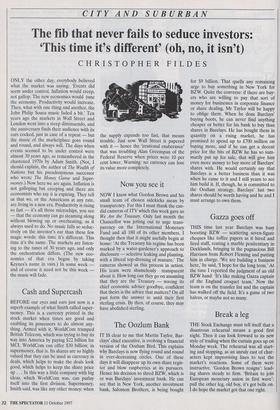CITY AND SUBURBAN
The fib that never fails to seduce investors: 'This time it's different' (oh, no, it isn't)
CHRISTOPHER FILDES
ONLY the other day, everybody believed what the market was saying: 'Events did seem under control. Inflation would creep, not gallop. The new economics would tune the economy. Productivity would increase. Then, what with one thing and another, the John Philip Sousa music faded a bit.' Ten years ago the markets in Wall Street and London went into a steep diminuendo, and the anniversary finds their audience with its ears cocked, just in case of a repeat — but the music of the marketplace goes round and round, and always will. The days when events seemed to be under control were almost 30 years ago, as remembered in the chastened 1970s by Adam Smith. (Not, I should explain, the author of The Wealth of Nations but his pseudonymous successor who wrote The Money Game and Super- money.) Now here we are again. Inflation is not galloping but creeping and there are economists who say it is expiring. They tell us that we, or the Americans at any rate, are living in a new era. Productivity is rising so fast — it's all those microchips, you see — that the economy can go steaming along without blowing up or overheating, as it always used to do. No music falls so seduc- tively on the investor's ear than these few magic words: this time it's different. This time it's the same. The markets are listen- ing to the tunes of 30 years ago, and only the orchestration differs. (The new eco- nomics of that era began by taking Keynes's name in vain.) In some week — and of course it need not be this week — the music will fade.


















































































 Previous page
Previous page